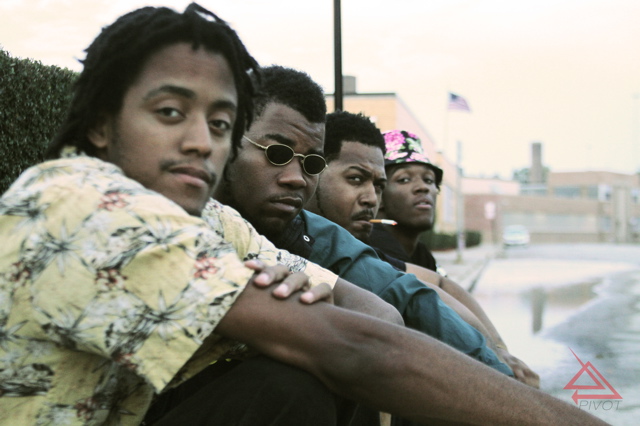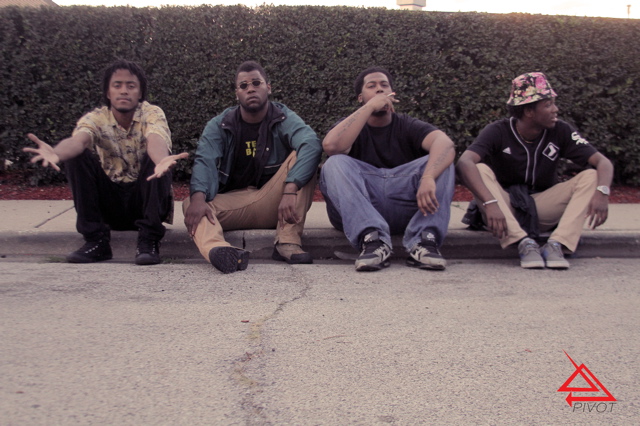Interview: Pivot Gang—Keeping It In The Family
By Jon Graef in Arts & Entertainment on Oct 2, 2013 4:00PM

There is no underestimating the rambunctious wit and creativity of young men. Harnessing that energy into potent hip-hop potions is Chicago's Pivot Gang, a group of four late-teens-and-early-twentysomething rappers hailing from the city's historic (and historically troubled) Austin neighborhood.
Brothers Saba and Joseph Chilliams (AKA Jerrel Chandler), along with their cousin, John Walt, and high school friend MFn Melo (AKA Logan Yutters), have been making music that's slowly gelled under the Pivot moniker over the past two years. That creative activity comes to fruition with the release of the group's forthcoming mixtape Jimmy, which the members have been steadily teasing in the past couple of months.
What's been released so far has had a diverse array of sounds, ranging from soulful throwback hip-hop to more ambient takes on harder-edged drill sound. Chicagoist spoke with all four Pivot Gang members on the heels of their video release for "Everytime I" and a recent trip in California.
We don't think we've ever laughed so hard during an interview, and hope that the group members' individual humor and charm comes through in article form. We chatted about how the Austin neighborhood influenced them musically, their respective creative processes, and how Jimmy is like the Playboy Mansion.
Chicagoist:Your manager tells me you were out in California recently. How was it out there, and what were you doing?
Melo: We were out there, networking. (Laughs.) Taking in the sights and whatnot, trying to expand this Pivot movement.
Saba: We were out in L.A., and we were trying to meet as many people as we can. That trip was pretty awesome. We were just trying to meet new people and expand the word of Pivot. We would just try to hand them stickers and other random shit on the street.
C: Oh, like people do in the Loop?
Saba: Only less creepy. (Laughs.) We went about it less creepy. It wasn't like, 'hey, check out my music on MySpace.' It was like (emphatic pause) conversation, and then, 'hey, we rap, and we kinda raw, come check us out. ' And everyone was like, 'OK, sure, we got you.'
C: So Saba, you and Joseph Chilliams are brothers. You grew up in Austin, right?
Saba: Indeed.
C: What was it like growing up there, and what's it like living there now? How did the neighborhood influence musically?
Joseph Chilliams: Growing up in Austin, it was pretty gangsta. But not like Boys In the Hood, though, they don't make movies about this shit yet. It helps with your music because everyone around you, depending on where you are, would be making music. It inspires people--just the struggle that you go through everyday; feeling like you gotta watch your back, and shit like that.
Melo: As an artist, it gives me a feeling like, 'it's not all bad.' We know what's on the other side. Something positive--it's not the grass being greener, but more like, 'you know that it doesn't have to be like this forever.'

C: It provides a point of inspiration and aspiration.
Melo: Yeah, like, 'man, I want to get that nice-ass house one day, that I'm looking at right now,' (laughs).
C: How did you guys get together, and how did you start making music?
Saba: Me and Joseph are brothers, so we always kind of knew each other. I could not not know Joseph, but I started playing piano around 8, probably, and I started making beats around 9.
Me and Joseph used to record back in the day on tape, and we met this young fellow named Melo in high school, and then Melo and we would rap. And then John Walt, he's me and Joseph's cousin. He's also from Austin. I think, from a really young age, we were always making music. It wasn't until the last two years that it became 'Pivot.'
C: So how did your creative process evolve throughout the years?
Chilliams: All of us rap, and with Sab and me making beats, It was a natural (fit). Not, like, one of us is a cypher, but everybody's making a song together. We had so many songs together, and you don't want to have a million songs like, 'featuring Melo' and 'featuring John Walt'.
If you make a collective, it will be a lot easier for people to take in, and then that developed into a group dynamic. Like, 'holy shit,' we are a group, and we are dope as fuck. And then Pivot was born, pretty much.
C: It also allows for a greater diversity of sounds. I was listening to the stuff on your personal Soundcloud page, Saba, and there was some real lush, soulful, Dilla-influenced music. And then the group's music have a little harder, drill-styled beats.
Melo: It's a different process when each of us makes our own songs. I know the sound I go for when I make my own songs isn't necessarily the same sound I go for on a big Pivot track. It's made the same, though, if that makes sense. Creation wise, the way the beat is made is the same--I'll try to do smooth kind of chords, like jazzy shit, and then it will turn into something different.
But a lot of the Pivot shit has that smooth kind of chord tradition that's influenced by New York soul, but it will just go harder. I'll put some drill drums over it. Some of my music has that same creative process, but a lot of it goes into a soulful, hip-hop-y route.
And then Joseph's shit—Joseph makes beats, too—a lot of it is more...
Chilliams: Sexy. (Laughs.)
C: (Laughs.) Well, yeah, you gotta have the sexiness in there.
Melo: I think that's what ultimately connects the songs together--the sexiness. (Laughs.)
C: So how sexy is Jimmy going to be?
Melo: Oooo...Jimmy is going to be...
John Walt: It's orgy-sexy.
Melo: Jimmy is going to be orgy-sexy. (Uproarious laughter.) You know how the Playboy mansion is eight rooms of stuff happening? That's what Jimmy's going to be.
Saba: Jimmy is interesting because it's all of the sounds that I described when I was talking about my music, Joseph's music, all of our individual stuff--on the Jimmy tape, it all kind of comes together.
Chilliams: There were some songs that we made where we really didn't know how to feel about them. But there's some other shit that we felt was our strongest, and we're in sync while we were making it. It just all fell together--like we're going to be the next great boy band. (Laughs.) You're going to see us just take off. The feeling that we have in our souls while making this music is what everyone else is gonna feel in their private regions.
C: So you want to be kinda like a boy band?
Chilliams: We don't want to be like a boy band.
[Pivot gang, almost simultaneously]: We ARE! (Laughs.)
John Walt: That's not at all fabricated.
Chilliams: The only difference is that a label didn't put us together. We met each other individually, and we just happened to be so pretty. (Laughs).
C: So there isn't a puppet master then?
John Walt: No strings.
C: Tell me about the videos you guys shot. "Everytime I" looks like it was shot in a public park, which is awesome.
John Walt: Going to shoot the videos, we weren't looking for some big, luxurious type of situation. We just had to do what we felt was right at the moment. A lot of stuff just happens. It happens in maybe an hour or so. There's not a lot of thought that goes into it, but, at the same time, we think about it. (Laughs.)
Chilliams: With a lot of Chicago hip-hop videos, there's two things: there's one of them in the hood, and then there's one of them downtown somewhere. I think we're trying to get out of that.
C: So how many tracks are on Jimmy, and what's the cover art going to be?
Melo: OoooOooo. The cover. The. cover...
Saba: We're finalizing the tracklisting, but it should be about 15-16 tracks.
Melo: And then the cover. Damn, ya'll...(laughs.)
John Walt: Hey, you can help us out. If you got any ideas, you can shoot them on over to [Pivot Gang manager] Jon. It's not a problem, but we have to address it eventually. But if you got any ideas, we sure could use them.
Chilliams: We're asking everyone. We figure that maybe someone could give us a nice answer, or maybe two people could give us an OK answer, and we can put those two together. (Laughs.)
C: So, what do you think the break-out track from Jimmy is going to be? What's gonna get heads boppin' and asses bouncin'?
Chilliams: All of them!
Saba: This song called "Nirvana" that hasn't came out yet. We used to perform that at YouMedia a long time ago, and it used to turn up so hard. That's why we saved it. We haven't put that out yet, but I know that can do a lot. And then there's this song called "Choo Choo" that's really obnoxious. And I don't think people will expect that from us. But, most likely, it won't be any of that.
C: Why is "Choo Choo" obnoxious?
Saba: You don't even want to know. (Laughs.)
C: Saba, you worked with (Austin-based poet) Malcolm London on a song. What was that like? How do you know him?
Saba: Malcolm London. Good ole Malcolm London...I think I met Malcolm London when I was sixteen at this weekly thing I use to go to called YouMedia...
C: That's where Chance the Rapper, I think, got his start.
Saba: ALL the cool people went to YouMedia. (Laugh.) But he randomly came to my house one day to record a rap. I have a studio in my basement, so I use to have a bunch of people at my house. Like, 'hey, I got this track I want to record,' or whatever. I see Malcolm London every week now.
Since then, he's...he's a pretty cool revolutionary fella. But yeah, working with him is interesting because he's so revolutionary. His ideas are different, kinda. Like, he did a poem to me just playing the piano. So, me and him have a few songs together that have never came out yet.
C: Will they see the light of day? In the form of an EP or something?
Saba: I haven't talked to him about that in a long time, but, to my knowledge, he was working on one, and they are really good songs. I am hoping they will.
C: Do you think there's an artistic renaissance going on in Austin right now?
Saba: I think so. I definitely think so. Damn, I forgot that Malcolm London is from down the street and shit. (Laughs.) I think, in Chicago in general...what was it somebody asked me in L.A.? Somebody in L.A. asked me what they were putting in our water.
Chicago in general, everybody who has that dream is getting it now. I think, creatively, we're on top.